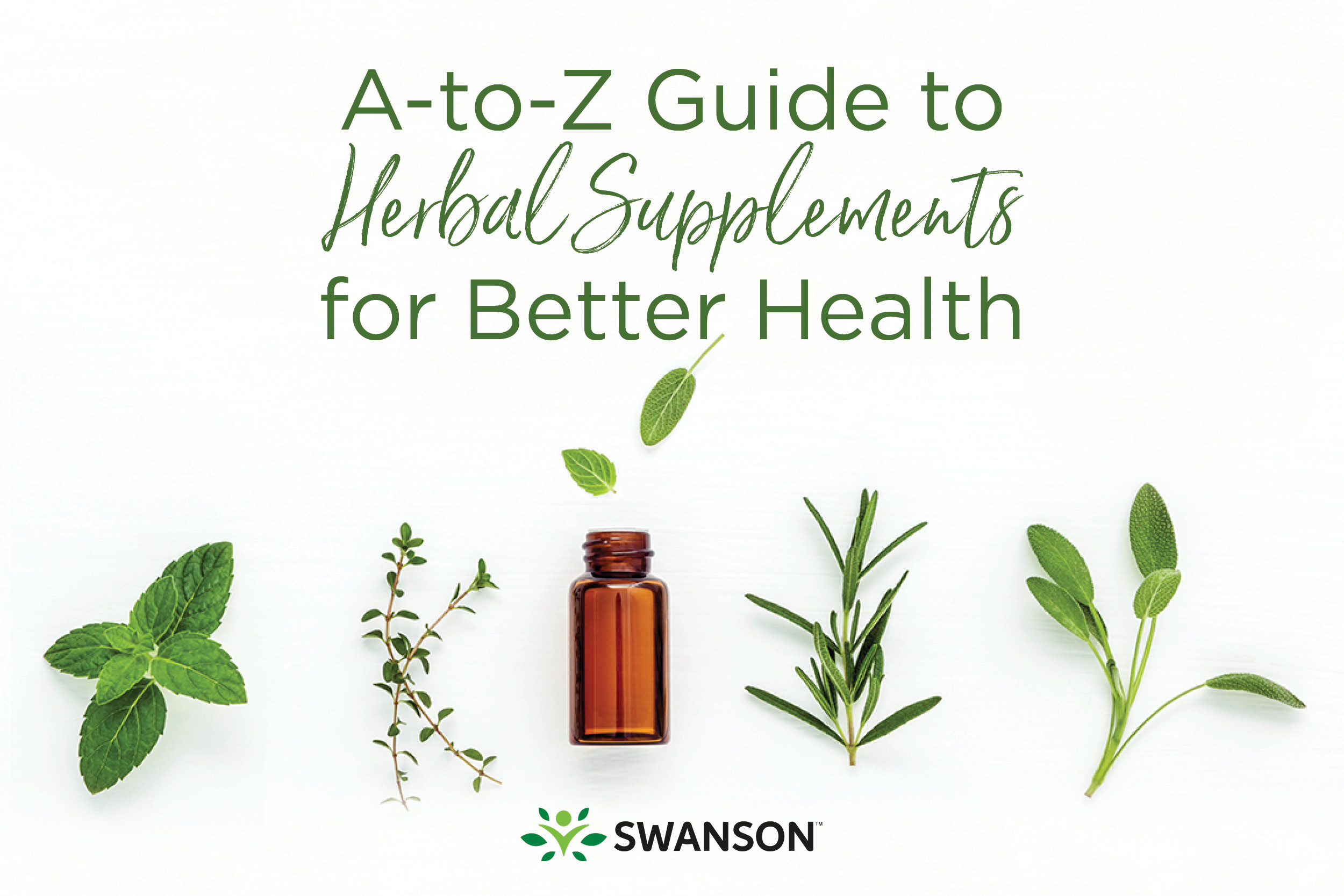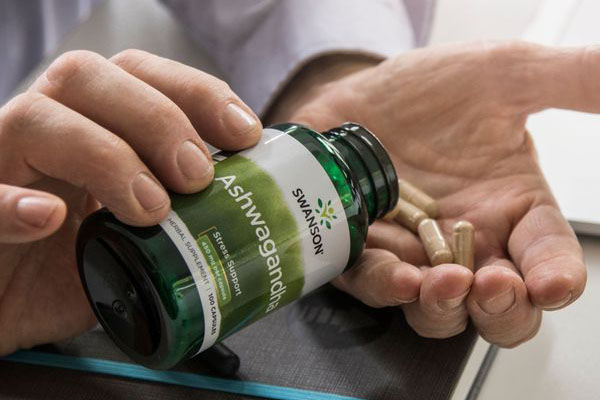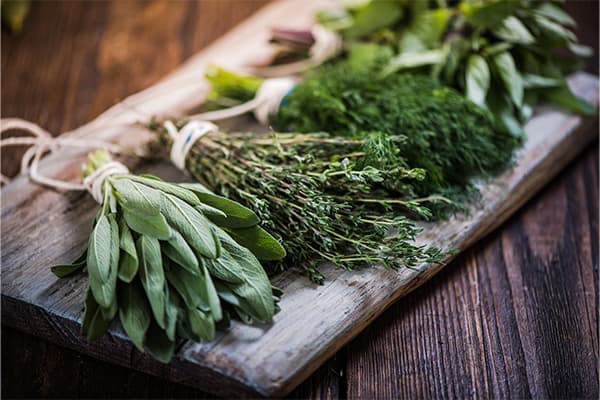Your A-Z Guide to Herbal Supplements
Looking for naturally-sourced ways to maintain health and vitality? We’ve rounded up a beneficial herb for every letter of the alphabet!
They’re Mother Nature’s way to fight stress, keep joints healthy, soothe digestion, support heart health and so much more. You’re sure to find an herb to fit every wellness routine and health goal.
Herbs to Fit Any Need
Here's a list of some of the most powerful, and popular, herbal supplements available for supporting your good health:
Ashwagandha
Our first herb isn't just fun to say, it's also very healthy! What is ashwagandha? Ashwagandha is an Ayurvedic herb with many uses, most frequently used as an energizing, stress-fighting adaptogen.
This herb promotes calmness and relaxation while enhancing mental and physical vitality. It’s also used to support sexual health for both men and women.1
Boswellia
Boswellia serrata is another time-honored herb with roots in Ayurvedic traditions. It’s used for comforting joints and promoting joint health.2
Sometimes called Indian Frankincense, the resin extract from this tree may also support respiratory health and even digestive health.3
Cinnamon
Much more than a kitchen spice, cinnamon is loaded with antioxidants and offers seemingly endless health benefits. Cinnamon supports cardiovascular health, promotes a healthy blood sugar response, provides metabolic support and it may even promote cognitive health.4
Bonus: It’s also delicious! Sprinkle cinnamon powder on your oatmeal or try a full spectrum cinnamon supplement to enjoy all the sweet benefits!
Dong Quai
Dong quai is an herb in the same family as parsley and is native to Japan and China. Dong quai is an energizing and harmonizing herb often taken to provide support during menstruation, as well as to help with menopausal and premenopausal concerns.5
Elderberry
The popularity of elderberry dates as far back as ancient Egypt, and it remains one of the most commonly used health tonics in the world to this day.6
Elderberries are high in vitamin C and a good source of antioxidant flavonols and phenolic acids, among other health-supporting substances, making them a potent immune-supporting tonic.
Elderberries are so popular that they often sell out in colder months, so stock up early! Consider using elderberry as part of your immune health support plan.
Fenugreek
Fenugreek is similar to clover and native to the Mediterranean region. Fenugreek leaves are eaten as a vegetable in India and its seeds are used as a health tonic for many benefits.
For men, fenugreek may help with a variety of sexual concerns including testosterone support and reproductive health.7,8
Ginger
Ginger is a time-tested herb that has a reputation for being one of the healthiest spices in the world. Ginger contains bioactive compounds that have antioxidant properties, help calm queasy stomachs and soothe digestion.
Studies show that ginger may also comfort muscles after exercise and support joints throughout the body.9
Try organic crystallized ginger as a snack or get the benefits in a premium ginger root supplement.
Holy Basil
Holy Basil, also known as Tulsi, is considered sacred by Hindus. It has adaptogenic properties that help counter the effects of stress, plus it has potent antioxidant components.10
It’s often consumed as a tea, such as in Organic Holy Basil tea. Holy Basil is also one of nature’s best sources of niacin (vitamin B3).10
Indian Gooseberry
You may know Indian Gooseberry by its other name: Amla fruit. This ancient Ayurvedic wellness tonic is loaded with antioxidant phytonutrients that support overall health and longevity.
Indian gooseberries contain vitamin E, vitamin C, tannins, phosphorus, iron and calcium, and fans of this fruit say it’s also great for keeping hair and skin healthy.12
Juniper Berries
Herbalists have been using juniper berries for a wide range of health applications for hundreds of years. Today, juniper supplements remain a favorite as a digestive aid, as a way to promote a healthy water balance in the body and to support urinary health.13
Juniper berry essential oil is also popular for its refreshing scent!
Kudzu
As a traditional favorite of Chinese herbalists dating back nearly 2,000 years, kudzu and its roots have antioxidant properties that may be even more potent than vitamin E.14
These properties make it an excellent herb for cardiovascular maintenance, liver health and generalized overall vitality.
Lemon Balm
Lemon balm is a fragrant herb garden staple that contains many active compounds, including antioxidant flavonoids and polyphenols that impart wellness benefits.
Researchers say it may help modulate neurotransmitter activity, thus helping with stress, feelings of anxiousness and sleep.15
Unwind with soothing lemon balm tea or try it as a lemon balm supplement.
Maca
Maca is a root herb similar in appearance to radishes or turnips. Just as much a superfood as an herb, it has many healthful benefits.
Maca is an adaptogen that helps the body adapt to stressors. It’s also used to boost energy, support a healthy libido, promote balance for women during menopause and boost immune health. 16,17
Research shows that maca may also benefit reproductive health for men.17,18
Noni
Noni is a fruit native to Southeast Asia that has been used as a health tonic for thousands of years. The fruit contains powerful antioxidants, including beta carotene, vitamin C and vitamin E.
Its traditional uses include promoting regularity, comforting muscles and joints and promoting overall wellbeing and immune health.19
Try it in certified organic noni juice or as a noni supplement.
Oregano
You’ll recognize this one from your favorite Italian dishes, but it’s much more than a flavor-enhancer for pizza and pasta!
Oregano oil extract provides antioxidants while promoting digestive function, immune function and soothing the respiratory system.20
Easily benefit from this herb by considering an Oregano Oil supplement.
Pygeum
Extract from the bark of the African Pygeum tree has been used for health purposes throughout the centuries, with its benefits primarily attributed to phytosterols within the plant’s bark and its extracts.
Pygeum supplements are used primarily for prostate, urinary tract and bladder health.21
Quinine
Made from the bark of the cinchona tree, you might recognize quinine from the ingredients label on tonic water, where it’s used in very small amounts for flavoring.
Quinine has played important roles in health for ages, but it's extremely potent and must be properly diluted. Many people use it as a homeopathic supporter of leg comfort, especially at night.21
Rhodiola Rosea
With more than 140 active components, rhodiola rosea is a beloved and widely-used adaptogen for stress support, feelings of anxiousness and many other health concerns.
It has been clinically studied for reducing work stress, fighting fatigue and boosting mood. Research shows it may also benefit brain function, reduce mental fatigue and boost work-related performance by as much as 20%!23
Saw Palmetto
Saw palmetto is an herb native to the southeastern United States. It’s a natural source of fatty acids and phytosterols and one of the most common herbs taken by men to support prostate health. It’s also used to promote urinary tract flow and maintain healthy hormonal balance.24
Try it in Swanson Premium Saw Palmetto.
Turmeric
Turmeric is a superfood spice with a wide variety of wellness benefits, most of which are attributed to a compound it contains known as curcumin.
Curcumin is an extremely potent antioxidant carotenoid pigment that’s been scientifically studied for everything from memory support to digestion, skin health, healthy aging, circulation and joint health.25,26
As a nutrient for joint health, turmeric may have comforting qualities and support healthy joint function.
Uva Ursi
Uva ursi is Latin for “bear’s grape,” a name it earned because bears seem to love its fruit and seek it out. It was originally used by Native American tribes as a general health tonic.
Urva ursi leaf supplements are today used to support kidney and urinary tract health, and many people take it alongside cranberry supplements for this reason.27
Valerian
Valerian is one of the most popular sleep- and relaxation-supporting herbs on the market. Its roots contain several beneficial compounds, including valerenic acid and isovaleric acid, that have a calming effect on the brain, promote sleep and reduce occasional stress and anxiousness.28,29
Wild Cherry Bark
A traditional favorite for generations, wild cherry bark is exactly what it sounds like: it’s an herbal tonic made from the inner bark of cherry trees!
Herbalists recommend it for supporting a healthy respiratory system. It’s often made into wild cherry bark syrup, but you can also get it in convenient wild cherry bark capsules.30
Xi Yang Shen
Xi Yang Shen, also known as American Ginseng and Panax quinquefolis, is revitalizing for both body and mind. It’s native to North America, but cultivated in China and used in many traditional Chinese health practices.
This stress-busting, energizing, immune-boosting herb is popular for promoting overall health and vitality.31
Yohimbe
Yohimbe is an evergreen tree native to Africa and it’s most frequently used for stimulating sexual excitement. A chemical in the plant may increase blood flow and nerve impulses, encouraging arousal.32
Yohimbe supplements are made from the bark of the tree, and you’ll often find it combined with other herbs in combination formulas for sexual health, or alone in yohimbe bark supplements.
Zedoary
Zedoary, also known as white turmeric, is a cousin of the turmeric mentioned above and shares many of its healthful properties. Like turmeric, zedoary is an ancient spice with a long history of use as a health tonic.
Due to its ability to support digestion and gastrointestinal health, it’s often found in digestive bitters.
Try it in NatureWorks Swedish Bitters.
Herbal Helpers for Better Health
Herbs are powerful health supports, and more and more studies are beginning to back up their traditional uses and allowing us to better understand how the compounds within each exert so many positive benefits in the body. Learn more in What Are Herbal Supplements?
Be sure to sign up for Swanson Health emails to get our hottest promotions and new educational resources just like this one delivered to your inbox.

About Lindsey Toth, MS, RD
Lindsey is a nationally-recognized registered dietitian and nutritionist with a soft spot for pie. She empowers people to take charge of their health by finding the balance between the pleasure and nourishment in food. Her philosophy is that you should take care of your body because it’s the only permanent home you have. It’s what inspired her to pursue a career in nutrition.
*These statements have not been evaluated by the Food and Drug Administration. These products are not intended to diagnose, treat, cure, or prevent any disease.
Sources
1. Ashwagandha. National Library of Medicine. Read source
2. Boswellia Serrata. Science Direct. Read source
3. Boswellia (Indian Frankincense). Healthline. Read source
4. Health Benefits of Cinnamon. HealthLine. Read source
5. Dong Quai. WebMD. Read source
6. Elderberry Health Benefits. HealthLine. Read source
7. Fenugreek. WebMD.Read source
8. Testofen. National Library of Medicine. Read source
9. 11 Proven Health Benefits of Ginger. Healthline. Read source
10. Holy Basil. WebMD. Read source
11. Can You Use Amla Powder for Hair Health? Healthline. Read source
12. The Health Benefits of Juniper Berries. Very Well Health. Read source
13. Juniper Berry. National Library of Medicine. Read source
14. 5 Lemon Balm Uses for Your Health. University Health News. Read source
15. Maca Treatment. PubMed. Read source
16. Benefits of Maca Root. Healthline. Read source
17. Lepidium Meyenii (Maca). PubMed. Read source
18. What is Noni Juice? HealthLine. Read source
19. Benefits and Uses of Oregano Oil. HealthLine. Read source
20. The Health Benefits of Pygeum. Very Well Health. Read source
21. Quinine in Tonic Water. HealthLine. Read source
22. Health Benefits of Rhodiola Rosea. HealthLine. Read source
23. Benefits and Uses of Saw Palmetto. HealthLine. Read source
24. Turmeric. WebMD. Read source
25. Turmeric. National Center for Biotechnology Information. Read source
26. What is Uva Ursi? Very Well Health. Read source
27. Valerian. WebMD. Read source
28. How Valerian Root Helps. HealthLine. Read source
29. Wild Cherry. WebMD. Read source
30. American Ginseng. WebMD. Read source
31. Yohimbe. WebMD. Read source



